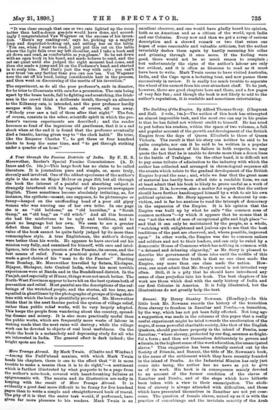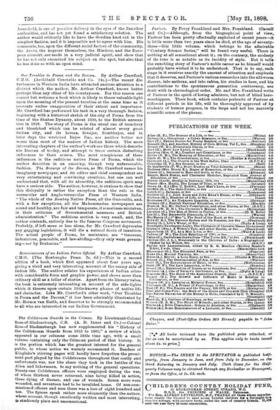Banani. By Henry Stanley Newman. (Headley.)—In this little book Mr.
Newman records the history of the transition from slavery to freedom in Zanzibar and Pemba,—a transition, by the way, which has not yet been fully effected. Not long ago a suggestion was made in the columns of this paper that a really useful experiment might be tried towards the amelioration of the negro, if some powerful charitable society, like that of the English Quakers, should purchase property in the island of Pemba, near Zanzibar, " where slavery, protected by our flag, assumes so fright- ful a form ; and then set themselves deliberately to govern and educate, in the highest sense of the word education, the emancipated slaves." This suggestion has been actually carried out by the Society of Friends, and Banani, the title of Mr. Newman's book, is the name of the settlement which they have recently founded in the island of Pemba. As the Industrial Mission has only just come into being, the author has no news as yet to give us of its work. His book is in consequence mainly devoted to an account of the former condition of the slaves of Zanzibar and Pemba, and of the steps which have hitherto been taken with a view to their emancipation. The aboli- tion of slavery is always attended with difficulties, and those which have presented themselves in Zanzibar are not yet over- come. The question of female slaves, mixed up as it is with the practice of concubinage and the inviolate sanctity of the Arab
household, is one of peculiar delicacy in the eyes of the Zanzibar authorities, and has not yet found a satisfactory solution. The author would evidently like to have the Gordian knot cut in the simplest fashion, and it is impossible not to agree with him. His comments, too, upon the different social factors of the community, the Arabs, the negroes themselves, the Hindoos, and the Euro- pean element, are made in a very judicial spirit, and show that he has not only examined his subject on the spot, but also that he has done so with an open mind.



































 Previous page
Previous page